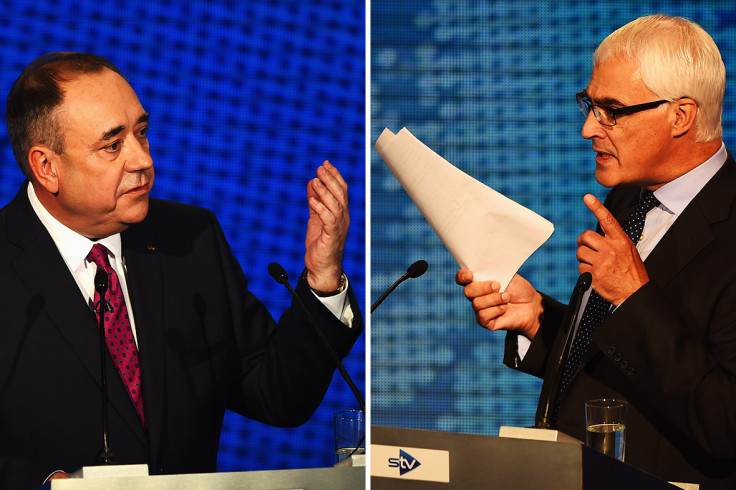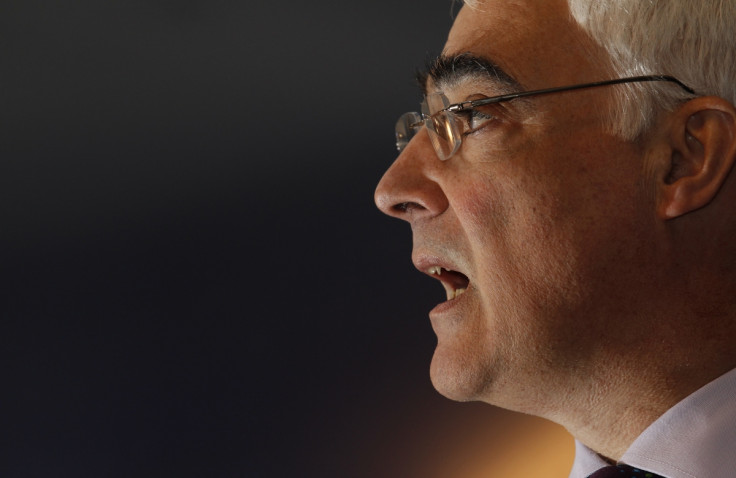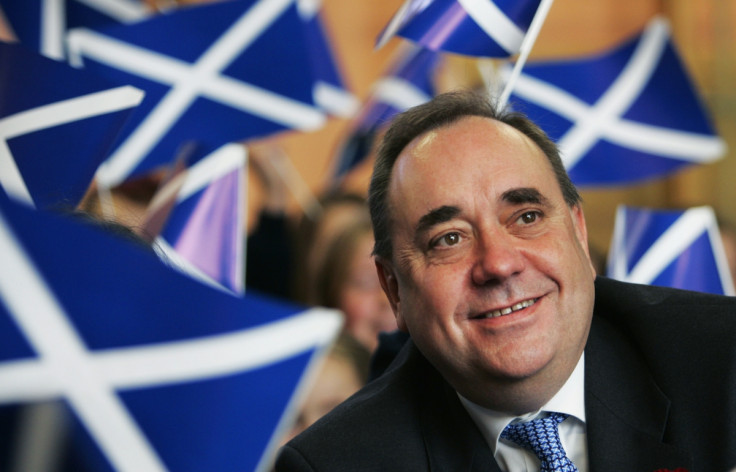Scottish Independence TV Debate: Salmond Pounded for Lack of Currency Plan B

The first televised debate between Scottish National Party leader Alex Salmond and Alastair Darling, head of the Better Together campaign, may have been expected to provide answers about how an independent Scotland would actually function, but instead it just raised more questions.
Over the course of the two hours of live sparring it became clear that Salmond was doing his best to deflect the discussion from crunch points of contention: the pound, the central bank, and what Scotland would do about cross-border regulation.
Despite Salmond's wads of "evidence" (transcripts of what Darling has said in interviews in the past) against the Yes camp, his delivery and choice of picking petty squabbles became tiring and irksome.
Somewhat exasperated with this line, Darling eventually asked: "Alex, if you want a bar room chat, we can do that another time".
Petty Squabbles
"Alastair, you were in charge of financial regulation when the banks went bust," said Salmond, referring to the 2008 financial crisis.
However, Darling hit back: "I was there in 2008 and I can tell you that when these banks were collapsing no other country in the world was rushing to bail them out," referring to a letter of support for the disgraced former head of RBS Fred Goodwin, who has since been stripped of his knighthood.
He was of course referencing to this:
"Yours for Scotland, Alex" #ScotDecides pic.twitter.com/JNFvO3Unyx
— Margaret Curran MP (@Margaret_Curran) August 5, 2014He added that "if Scotland was independent at the time of the financial crisis, it would have gone bust like Ireland and Iceland. Scotland would not have been able to deal with it, without the help of the rest of the UK."
On top of that, Salmond used his crucial 12 minutes of cross examination to Darling to throw in bizarre questions about whether the former Chancellor agreed with j̶o̶k̶e̶s̶ statements from other politicians that Scots would have to drive on the right side of the road if they became independent.
Even the MP which Salmond was referring to was confused:
Can't believe a weak joke I once made about Scotland driving on right has actually been quoted by Salmond. He's lost the plot. #ScotDecides
— Andy Burnham (@andyburnhammp) August 5, 2014Salmond at one point asked Darling: "Alastair, why do you call the Better Together campaign 'Project Fear'?"
He was referring to a newspaper article that cited sources within the group saying that's what they called the campaign internally.
"I don't," said Darling, saying that even if it was said, it was probably a joke.
But even if it was referred to Project Fear, it is pertinent to think of why that would work on the masses. Salmond and the Yes camp have had the opportunity to outline exactly what their plans are for an independent Scotland, but instead no new concrete ideas have been presented.
'What's Your Plan B?'

When Darling came to grill Salmond for his 12 minutes, Scotland's first minister may have well have stuck his fingers in his ears and sung "lalalalala" to abate being asked more.
When Darling repeatedly asked "what is your Plan B, if you don't get the pound," Salmond didn't give one.
Instead he said "we will keep the pound. It's ours too and it's in the interest of the UK and Scotland to keep it. It's logical and important."
However, becoming agitated, Darling said "the pound doesn't belong to any of us, not England, not Wales, not Scotland. It is controlled by the Bank of England and if you sever that tie, there is no guarantee you'd have it".
He has a point. All the main political parties, as well as European Union officials said that Scotland would lose the sterling and its membership to the bloc, if it did walk away from the UK.
Darling kept asking the same question and Salmond kept skirting the issue.
Eventually Darling said "it's stupidity on stilts."
"Any eight-year-old can tell you the flag of a country, the capital of a country and its currency. I presume the flag is the saltire, I assume our capital will still be Edinburgh, but you can't tell us what currency we will have. What is an eight-year-old going to make of that?"
Even an irate audience member asked Salmond, "why, when everyone has said you cannot have the pound, that you repeatedly say we are going to keep it? What don't you understand?"
Oil

The National Institute of Economic and Social Research (NIESR), citing figures from the Scottish government, said around two thirds of all income from profits and employment due to the North Sea oil and gas industry were retained in Scotland to a tune of over £10bn (€12.5bn, $17bn) in 2010.
Salmond has repeatedly touted the sector as a jewel in Scotland's crown while Whitehall and independent experts and economists have consistently warned and cited statistics that show the industry is not as liquid as it once was.
"Scots see North Sea oil as a blessing but Whitehall makes out like it's a curse," said Salmond.
However, Darling said "we know that North Sea oil is in decline. Last year Scotland lost £4bn from it."
The statistics back this up.
The Office for National Statistics (ONS) revealed that the rate of profit at oil and gas exploration and extraction companies tanked to 27.6% in the first quarter of 2014 - its lowest level since the second quarter of 2009.
Meanwhile, the Organisation of Petroleum Exporting Countries (Opec) revealed that the average oil output in 2013 from the North Sea registered its lowest level since 1977.
On 11 July, chief secretary of the UK Treasury, Danny Alexander said the SNP had over-estimated revenues from the North Sea by £5bn in the 2012/13 and 2013/14 years and called their forecasts "fantastical."
So Who 'Won'?
Well the one thing for certain is the Scots lost out.
The two hour debate was a prime opportunity for the Yes Scotland camp to outline exactly what its plans are over the key issues such as the currency, regulation, EU membership, or even how pensions will be paid.
For Salmond, his closing statement was trying to reach out to those disillusioned by being governed from Westminster.
"Independence will mean that the people you vote for, will govern you. One thing we can say with absolute certainty, is that when we have a general election, the parliament will have the people you vote for in it."
Darling used his closing statement to also warn Scots about the finality of their impending decision.
"My case this evening is this: no one, no one will do a better job of running Scotland than the people who live and work in this country," he said.
"If we decide to leave, there's no going back. There's no second chance. For us, the choice is very, very clear. I want to use the strength of the UK to make Scotland stronger. [A] vote against independence isn't a vote for no change."
He added: "Let's say it with confidence, let's say it with pride, let's say it with optimism, no thanks to the risks of independence."
Scottish people will vote in an independence referendum on 18 September, 2014, and will be asked the straight "yes/no" question: "Should Scotland be an independent country?"
© Copyright IBTimes 2025. All rights reserved.






















